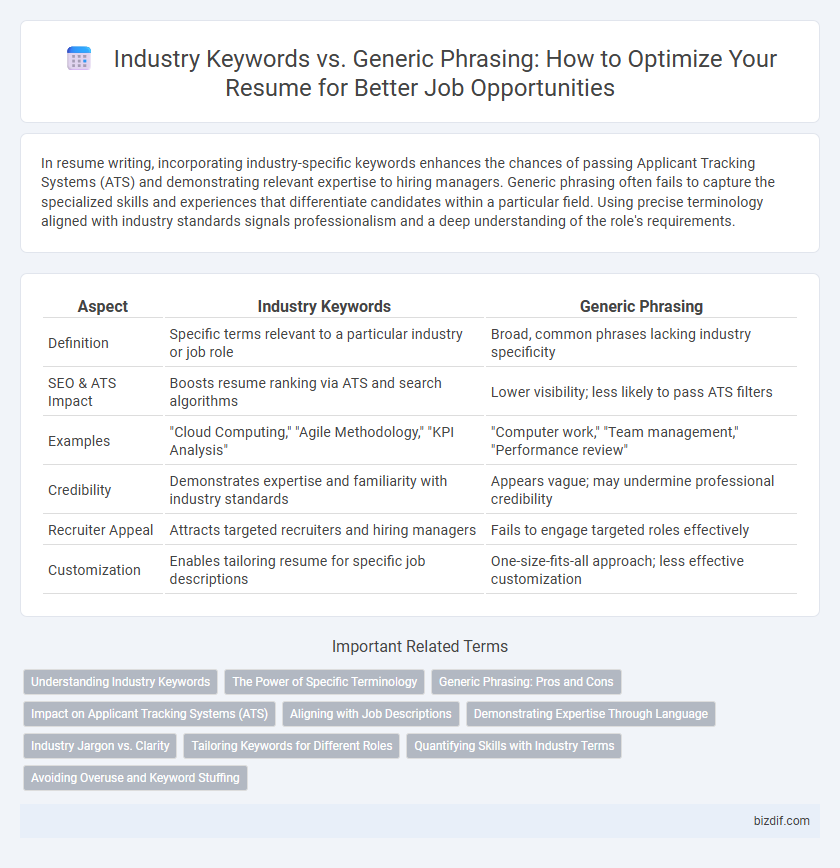In resume writing, incorporating industry-specific keywords enhances the chances of passing Applicant Tracking Systems (ATS) and demonstrating relevant expertise to hiring managers. Generic phrasing often fails to capture the specialized skills and experiences that differentiate candidates within a particular field. Using precise terminology aligned with industry standards signals professionalism and a deep understanding of the role's requirements.
Table of Comparison
| Aspect | Industry Keywords | Generic Phrasing |
|---|---|---|
| Definition | Specific terms relevant to a particular industry or job role | Broad, common phrases lacking industry specificity |
| SEO & ATS Impact | Boosts resume ranking via ATS and search algorithms | Lower visibility; less likely to pass ATS filters |
| Examples | "Cloud Computing," "Agile Methodology," "KPI Analysis" | "Computer work," "Team management," "Performance review" |
| Credibility | Demonstrates expertise and familiarity with industry standards | Appears vague; may undermine professional credibility |
| Recruiter Appeal | Attracts targeted recruiters and hiring managers | Fails to engage targeted roles effectively |
| Customization | Enables tailoring resume for specific job descriptions | One-size-fits-all approach; less effective customization |
Understanding Industry Keywords
Understanding industry keywords is crucial for tailoring resumes to specific job markets, as these terms align closely with employer expectations and applicant tracking systems (ATS). Using precise industry jargon and technical vocabulary enhances a resume's relevance, improving its chances of passing ATS filters and catching recruiters' attention. Incorporating keywords from job descriptions and professional standards increases the likelihood of demonstrating sector-specific expertise and improving overall candidate visibility.
The Power of Specific Terminology
Using industry keywords in resumes significantly enhances the chances of passing Applicant Tracking Systems (ATS) and grabbing recruiters' attention. Specific terminology tailored to the target job demonstrates expertise and aligns skills with employer expectations more effectively than generic phrasing. Incorporating power verbs and precise technical terms strengthens the resume's relevance and credibility within a particular field.
Generic Phrasing: Pros and Cons
Generic phrasing in resume writing offers broad appeal, making it easier to tailor the resume for diverse roles and industries by using universally understood terms. However, it may dilute the impact of specific qualifications and skills, causing the resume to be overlooked by applicant tracking systems (ATS) that prioritize industry keywords. Balancing generic language with targeted terminology enhances the likelihood of passing ATS filters while maintaining clarity for human reviewers.
Impact on Applicant Tracking Systems (ATS)
Incorporating industry-specific keywords significantly enhances a resume's compatibility with Applicant Tracking Systems (ATS), improving the likelihood of passing initial screenings. Generic phrasing often fails to match the precise terms ATS algorithms are programmed to identify, reducing visibility to recruiters. Tailoring resumes with relevant industry jargon aligns applicant profiles with job descriptions, optimizing searchability in ATS databases.
Aligning with Job Descriptions
Using industry keywords in a resume significantly enhances relevance by aligning with specific job descriptions and applicant tracking systems (ATS). Targeted keywords like "project management," "data analysis," or "customer relationship management" demonstrate familiarity with the sector and increase the likelihood of passing automated filters. Generic phrasing, such as "good communication skills," often lacks precision and fails to capture the recruiter's attention or match specialized role requirements effectively.
Demonstrating Expertise Through Language
Using industry-specific keywords in resumes highlights professional expertise and aligns with applicant tracking systems (ATS) to increase visibility. Generic phrasing often lacks the precision needed to convey specialized skills and experience clearly, reducing the impact on hiring managers. Incorporating technical terms and relevant jargon demonstrates proficiency and positions candidates as knowledgeable and competent within their field.
Industry Jargon vs. Clarity
In resume writing, integrating industry keywords ensures alignment with applicant tracking systems (ATS) and demonstrates sector-specific expertise, enhancing the candidate's credibility. While industry jargon can showcase familiarity with specialized roles, excessive or obscure terms may reduce clarity and alienate recruiters unfamiliar with the language. Balancing precise terminology with clear, understandable phrasing maximizes both keyword optimization and reader comprehension.
Tailoring Keywords for Different Roles
Tailoring industry-specific keywords in your resume significantly improves applicant tracking system (ATS) compatibility and resonates with hiring managers seeking specialized skills. Using generic phrasing may cause your resume to be overlooked due to lack of relevance or specificity for targeted roles. Incorporate terminology and buzzwords unique to each industry or job description to demonstrate expertise and increase interview opportunities.
Quantifying Skills with Industry Terms
Integrating industry-specific keywords and quantifying skills with concrete metrics significantly enhances a resume's visibility in applicant tracking systems (ATS) and captures recruiters' attention. Using precise terms such as "increased sales revenue by 30%" or "managed a team of 15 engineers in a software development lifecycle" aligns with sector standards and showcases measurable achievements. Prioritizing domain-specific language over generic phrasing like "worked on projects" ensures clarity and demonstrates expertise tailored to the target industry.
Avoiding Overuse and Keyword Stuffing
In resume writing, integrating industry-specific keywords enhances relevance and helps pass Applicant Tracking Systems (ATS) more effectively than generic phrasing. Avoiding keyword stuffing ensures the content remains readable and professional, preventing the resume from appearing mechanical or spam-like. Balanced keyword use tailored to the job description improves both human and AI reviewer engagement, increasing interview prospects.
Industry Keywords vs Generic Phrasing Infographic

 bizdif.com
bizdif.com